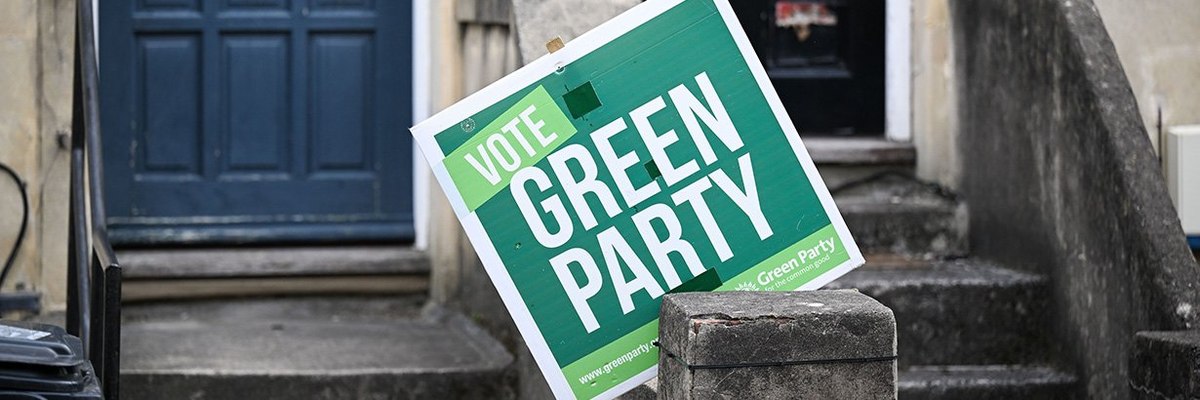New YouGov poll of Green Party of England and Wales members also explores what issues are important to members, and where they stand on issues like climate change, housing, and trans rights
During the course of mid-August, YouGov conducted a poll of Green members in the backdrop of that month's leadership election, subsequently weighting the data to reflect the result of that election.
Now, with the Green Party conference about to begin, the data gives an insight into Green members’ attitudes to party figures, policy issues, and future direction of the party.
What do Green members think of Zack Polanski, other top Greens, and other UK party leaders?
Unsurprisingly, the newly elected Zack Polanski scored very highly with Green members shortly before his landslide election in the leadership contest. Eight in ten members (79%) gave a favourable view of Polanski, compared to only 4% with a negative opinion.
Green members also have a positive impression of the job his predecessors – Carla Denyer and Adrian Ramsay – have done as co-leaders of the Greens, with 86% saying they performed well.
More specifically, 85% have a favourable view of Denyer, notably higher than the 60% with a positive impression of her former co-leader Ramsay (the latter having been criticised in party circles on trans issues, having refused to say that “trans women are women”, for instance).
Ramsay’s co-candidate in the recent leadership election – Ellie Chowns, MP for North Herefordshire – receives a similar score, at 59%.
Separately, Siân Berry – another high profile Green MP who succeeded Caroline Lucas in Brighton Pavilion – rates highly among members, with 78% having a favourable view of her.
Looking outside of the party, ostensible Your Party co-leader Jeremy Corbyn proves extremely popular with Green members, with 83% having a positive view of him.
Ed Davey also proves popular, with the majority (58%) expressing a favourable opinion of the Lib Dem leader.
Keir Starmer proves markedly less so, with only 18% having a positive opinion of the prime minister, and unsurprisingly almost none like Tory leader Kemi Badenoch (1%) or Reform leader Nigel Farage (0%).
Green members validate Polanski’s stance that the party should campaign on more than just climate change
During his pitch to be leader, Zack Polanski described himself as an “eco-populist”, and made clear that he wanted the party to focus on broader issues of the left, rather than simply climate change.
Green members validate this stance, with 91% saying it is important for the party to be offering policies on a range of different issues, rather than focussing primarily on the environment and climate change (7%). This proved to be the case even among members who backed the Ramsay-Chowns leadership ticket (81%).
Polanski’s candidacy also challenged the conventional approach the Green party held to its leadership composition, namely that it should have two co-leaders.
Having just elected Zack Polanski against a co-leader ticket of Ramsay and Chowns, the Greens are obviously willing to accept a single leader, and indeed this turns out to be the membership’s active preference. Half (48%) of Greens say they would prefer the party have a single leader, while only 19% opt for co-leaders.
Are Green members willing to make compromises in order to be more electable?
The conventional wisdom is that all parties must make compromises in order to win power, and this is especially true for small parties.
The results of our survey show that the majority of Green members (55%) are willing to make only small compromises in order to make the party more electable. A further 20% declare themselves “completely unwilling” to see the party compromise, while a further 21% are willing to endorse moderate compromises in order to be more electable. Just 2% are prepared to see large compromises take place.
Those who voted for Polanski are more reticent about making compromises in order to improve electability than those who backed Ramsay and Chowns.
Are Green members willing to govern in coalition?
It is currently unlikely that the Greens would initially enter government by themselves, so the key question of willingness to enter coalition arises. Our survey finds that a small majority of Green members (54%) would be willing to go into coalition with Labour as a junior partner. However, 43% are opposed to such a move, including the majority (54%) of Polanski voters.
More palatable – although less realistic – is the prospect of entering government with the Liberal Democrats forming the main governing party. Three quarters of Green voters (75%) would be amenable to this scenario, compared to 24% opposed.
Unsurprisingly, barely any Greens (0-1%) would be willing to enter office alongside the Conservatives or Reform UK.
While we did not ask about the prospect of governing alongside the-currently-named Your Party, we did ask about proposals for the two parties to form an electoral pact whereby they do not stand candidates against one another in their target seats. The Green membership are highly amenable to such a pact, with 83% supporting it, including 58% who “strongly support” it.
What are the most important issues to Green members?
Unsurprisingly, the environment comes top for Green voters, with 81% including it in their top three issues facing the country.
Far behind in second place is health, at 49%, followed by housing on 39% and the economy on 32%.
By contrast, immigration – which tops the list of most important issues for the British public in general – hardly features, with a mere 4% of Green members putting it in their selection.
However, it is worth noting that we used our customary list of national issues, which does not contain more specific individual issues that particularly exercise Green members, like the Gaza conflict and trans rights.
Green Party members on climate change
Our survey also tested Green members’ views on a couple of standard climate change tracker questions.
In terms of where we stand in the battle against climate change, the vast majority of Green members (83%) believe that humanity is still able to avoid the worst effects of climate change, but we would need to take a drastic change in our approach in order to do so.
Only 15% think it is already too late to avoid the worst effects, and a mere 2% think the current approach is adequate.
When it comes to climate change spending as a priority, the vast majority (89%) say that such spending should be prioritised and greatly increased, even if this means cuts are needed elsewhere.
Only 4% see greater priorities at the current time.
Green Party members on housing
With housing coming third in the list of top issues for Green members, further results show that the party membership are very pro-housebuilding. Seven in ten (72%) support large numbers of new homes being built nationally, with almost as many (66%) saying the same of their local area.
Support is especially high among younger Greens, and those who voted for Polanski.
Green Party members on transgender status
The Green membership is strongly unified on transgender status. Fully 90% believe that people should be able to identify as a different gender to that recorded at birth, while 80% think the law should allow people to change their legal gender. These figures compare to 49% and 34% respectively among the wider public.
What do you think about the Green Party, their chances of getting into government in coming years, and everything else? Have your say, join the YouGov panel, and get paid to share your thoughts. Sign up here.
Photo: Getty












